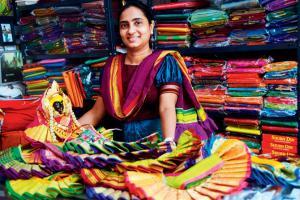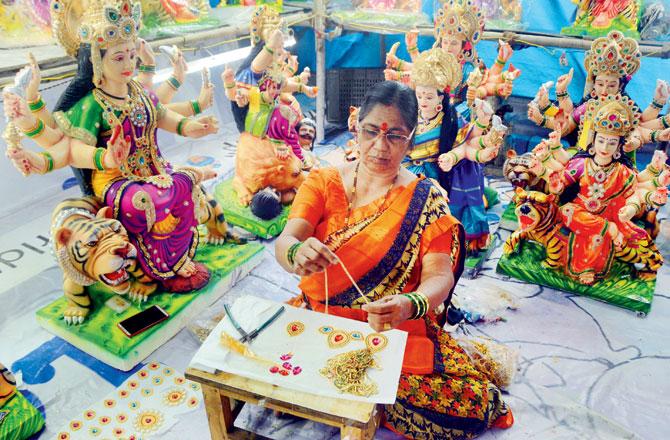Research on the gender implications of COVID-19 shows a spike in womens work load during home-bound festivals, the upcoming Navratri being no exception

Readymade nauwari saree designer Vaishali Naik says the demand for Devi's clothes are overflowing. Her pre-Navratri gifting packages include the gift of the Devi's attires and jewellery. Pics/Satej Shinde
![]() Time poverty is a provoking concept, which is deconstructed in the latest UN Women report on the gendered effects of the COVID-19 pandemic. The UN body says plainly: "more bodies at home means more people to feed and care for, often without additional help, increasing tensions and stretching household resources." The concept wakes us to the time-poor women around us who lack me-time due to unpaid intangible house work—be it supervision of online school-goers, cooking for working-from-home spouses or prepping for religious festivals (upcoming Navratri), now to be celebrated indoors.
Time poverty is a provoking concept, which is deconstructed in the latest UN Women report on the gendered effects of the COVID-19 pandemic. The UN body says plainly: "more bodies at home means more people to feed and care for, often without additional help, increasing tensions and stretching household resources." The concept wakes us to the time-poor women around us who lack me-time due to unpaid intangible house work—be it supervision of online school-goers, cooking for working-from-home spouses or prepping for religious festivals (upcoming Navratri), now to be celebrated indoors.
ADVERTISEMENT
In fact, time poverty gels beautifully with the sentiment captured in the Marathi adage "kaam nahi kadicha, pan visaava nahi ghadicha," which translates to "no (quantifiable) work done, yet no time for rest." Globally speaking, a homemaker's chores take up extended hours, and yet, assume no definite shape or form. In the local context, religious festivals (currently to be contained in the private family realm due to fear of spread of COVID-19) add to women's work load.
As women's rights activist-researcher Dr Vibhuti Patel, who retired from TISS' Advanced Centre For Women's Studies, observes, Mumbai women's lives have become more demanding post-COVID. "With Navratri approaching, and Dussehra-Diwali to follow within a month, one can witness that certain traditional responsibilities have come back to the women's court. Research proves that women tend to make sweets and snacks in many urban homes, which at one point were sub-contracted." Dr Patel has particularly factored in urban households of Mumbai which indulge in frequent fasting. In the just-gone Shravan, as well as the ongoing Adhik maas, fasting practices abound. That calls for a varied savoury-confectionary fare, which is time-consuming and tiring for the makers, she maintains.

Idol maker Jayashree Mhatre who sells murtis from her Malad warehouse, says despite COVID-19, the demand for her murtis has been consistent as women associate the Amba murti with a sense of power
Dr Patel has been studying the unusual juxtaposition of traditional and new-age responsibilities for women. She feels child care burden, elder care work, kitchen chores were anyway never equally divided. But, post-COVID, the unfairness of sharing work load has come out so vividly. "As a society, and even at the governmental level, we don't seem to acknowledge the disparity. Not just in India, but in most of South Asia, governments are in the 'do nothing about it' mode," she laments. Her observations on the impact of lockdown on women, published in Mumbai University's Sambhasan e-journal dedicated to the pandemic, claim that unaddressed gender inequities could one day lead to major social unrest.
Many agree with Dr Patel's thesis on unpaid undervalued housework. However, not all can smell a rebellion in the coming months. Sixty-two-year-old Rupali Adenwala, a Khotachiwadi Girgaum resident, takes the additional work load in her stride, with or without COVID-19. The Adenwalas, a Hindu family belonging to the Pachkalshi caste (often mistaken as Parsis), have been Girgaum residents for over five decades, and have had large-scale Navratri pujas on the fifth, eighth and ninth day of the festival. Being the seniormost in the hierarchy of married women, Rupali Adenwala takes on a sizeable share in preparing an indigenous cuisine for the Devi. Around 50 married women usually are invited for the haldi-kumkum on Panchami day; there is a special hom (sacrificial fire) ceremony on the eighth day, which calls for a non-vegetarian mutton meal. "This family tradition cannot be discontinued, we can only scale it down in COVID-19," says Adenwala, adding that social distancing norms in fact will add to the logistics list. Masks and sanitisers will have to be stocked, a reality never visualised by the Girgaum neighbourhood.
In yet another household in Malad, the situation is trickier rather, more demanding. The Prabhudesais keep the nandadeep lit for nine days as part of a 60-year-old tradition that honours the family and village deity with auspicious abundant light. Smita Prabhudesai, 67, doesn't leave the home on any of the nine days, though this year the celebration is anyway a fully indoor dynamic. "It's our duty towards keeping the diya ever-lit, come rain, COVID-19 or lockdown. We won't make an exception for anything," she states, adding she draws energy from the ritual.
Political scientist and Associate Professor of Humanities and Social Sciences at Indian Institute of Science Education and Research, Pune, Dr Chaitra Redkar, observes festivals sociologically, and analyses the impact of popular rituals. She feels when the mass celebration in public spaces is not allowed, two possibilities emerge.
First, people create/adhere to rituals more religiously, much more than usual because of the social vacuum, often at the cost of health. Second, women are at the receiving end of the story, so is true of other marginalised sections. Just as the pandemic impacted the migrant labourer, more than the middle class, similarly women/homemakers suffered severely and in diverse ways as compared to other family members. "It is brought to light by many sociologists that women, often voluntarily, bear immense increased domestic burden across societies, and worse is also the increase in the cases of domestic violence."
Dr Redkar points out that women, unwittingly, fall in a consumerist trap while accepting religious rituals. For instance, the colour-coded sarees and women photo ops, which characterise Navratri, form part of the larger sponsorship economics that is reflected in mass media. This year, due to COVID-19, sarees may not dominate the office space, but they will still encompass the social media platforms. The everyday officegoer, and also the everyday mobile phone user, is unaware about contributing to feeding market forces.
Founder of Girgaum App and editor of MahaMumbaiNews portal Sudeep Naik agrees with Dr Redkar's take on Navratri's transition to the digital world. As the chief organiser of Girgaum's women-centric Sharadotsav festival held in the nine key wadis during Navratri, Naik, a prominent Shiv Sainik, has had to curtail all contests and entertainment avenues. "It's our government in Maharashtra, so we have to be doubly responsible for scaling down festivities. But, I am happy that Mumbai women keep the mood upbeat." He refers to the scores of recipe videos, online Antakshari contests, intra-family bhajan singing FB Lives which "run on the fuel called women."
Readymade nauwari saree designer Vaishali Naik also stands testimony to women's zest. While the women customers at her Malad boutique Char Choughi have dwindled, her online orders have spiked. The demand for Devi's clothes are also overflowing. She was among the first designers to have introduced the pre-Navratri gifting ideas, which includes the gift of Devi's (nine day) attires and jewellery. Similarly, idol maker Jayashree Mhatre, who sells murtis from her Malad warehouse, endorses similar demand from women. "Women associate the Amba murti with a sense of power. They love to accessorise the shadu idol with the best of jewellery and flowers. Even during COVID-19, women don't want to give up the access window offered by Amba mata."
As COVID-19 exposes vulnerabilities in social, political and economic systems, garba choreographer Goral Joshi, 28, a Girgaum resident, who, like every year, won't travel to Borivli for all nine days to perfom in Falguni Pathak's iconic Navratri pandal, brings in her worldview. Going by her clients seeking online garba tuitions in India as well as in the US, she feels women are treating indoor Navratri as an opportunity for physical activity, irrespective of the social distancing norms in place. Upskilling is the word, which women welcome, even in the pandemic.
Sumedha Raikar-Mhatre is a culture columnist in search of the sub-text. You can reach her at sumedha.raikar@mid-day.com
Keep scrolling to read more news
Catch up on all the latest Mumbai news, crime news, current affairs, and a complete guide from food to things to do and events across Mumbai. Also download the new mid-day Android and iOS apps to get latest updates.
Mid-Day is now on Telegram. Click here to join our channel (@middayinfomedialtd) and stay updated with the latest news
 Subscribe today by clicking the link and stay updated with the latest news!" Click here!
Subscribe today by clicking the link and stay updated with the latest news!" Click here!






